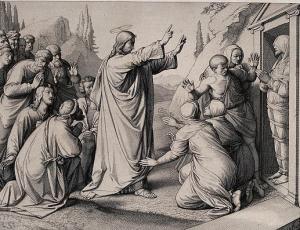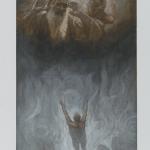[all the information you need if the topic comes up and someone claims that these practices “aren’t biblical”; all verses RSV]
1. Saints in Heaven Are Aware of Earthly Events
Hebrews 12:1 (“we are surrounded by so great a cloud of witnesses”).
Revelation 6:9-10: “I saw under the altar the souls of those who had been slain for the word of God and for the witness they had borne; they cried out with a loud voice, ‘O Sovereign Lord, holy and true, how long before thou wilt judge and avenge our blood on those who dwell upon the earth?’”
2. Extraordinary Characteristics of Departed Saints
Departed saints “see his face” (Rev 22:4) and see God “face to face” (1 Cor 13:12), with God as their “light” (Rev 22:5). They are “like” Jesus (1 Jn 3:2) and are fully “united to the Lord” and “one spirit with him” (1 Cor 6:17). They are “filled with all the fulness of God” (Eph 3:19) and “the fulness of Christ” (Eph 4:13). They are fully “partakers of the divine nature” (2 Pet 1:4) and totally free of sin (Rev 19:8; 21:8, 27; 22:14-15). They are “equal to” angels (Lk 20:36) or “like angels” (Mt 22:30; Mk 12:25). Jesus said, “I tell you, there is joy before the angels of God over one sinner who repents” (Lk 15:10). If angels know that, and we will be “equal” to them, then dead saints in heaven can certainly hear a petition, since by analogy to the angels they’ll be able to discern interior thoughts.
Christians “are being changed into his likeness from one degree of glory to another” (2 Cor 3:18). This is perfected in heaven. Departed saints “understand fully” (1 Cor 13:12) and possess perfect knowledge (1 Cor 13:9-10). Paul implies that believers even while on the earth can achieve “the knowledge of his will in all spiritual wisdom and understanding” (Col 1:9) and can obtain “all the riches of assured understanding and the knowledge of God’s mystery, of Christ” (Col 1:10). How much more the perfected saints in heaven? St. Paul was “caught up into Paradise” and “heard things that cannot be told, which man may not utter” (2 Cor 12:3-4). He states that now we only “see in a mirror dimly” and ” know in part” (1 Cor 13:12), and that “eye has not seen” (1 Cor 2:9) what God has prepared for us.
Therefore, being able to hear our prayers and intercede for us would clearly be just two of many extraordinary — and much more extraordinary — characteristics of departed saints and of angels.
3. Departed Saints in Heaven Praying for Those on Earth, or Presenting Their Prayers to God
Revelation 5:8 “the twenty-four elders fell down before the Lamb, . . . with golden bowls full of incense, which are the prayers of the saints”.
Jeremiah 15:1: “Then the LORD said to me, ‘Though Moses and Samuel stood before me, yet my heart would not turn toward this people . . .’ ” This presupposes that Moses and Samuel (both known for intercession) have stood before God interceding for people on earth.
2 Maccabees 15:12-16 also describes Onias, a high priest (1 Macc 12:7-8, 19-20), and Jeremiah praying for the Jews and Jerusalem.
4. Angels in Heaven Praying for Those on Earth, or Presenting Their Prayers to God
Revelation 8:2-3 “another angel came and stood at the altar . . . and he was given much incense to mingle with the prayers of all the saints upon the golden altar before the throne; and the smoke of the incense rose with the prayers of the saints from the hand of the angel before God.”
Tobit 12:15 I am Raphael, one of the seven holy angels who present the prayers of the saints and enter into the presence of the glory of the Holy One. (cf. “seven spirits of God”: Rev 1:4; 3:1; 4:5; 5:6, who help spread God’s grace [Rev 1:4]).
5. Permissible Communication with Departed Saints
John spoke to one of the “elders” in heaven (Rev 7:14).
Jesus Himself invoked a dead person twice: Jairus’ daughter (Mk 5:41: “Little girl, I say to you, arise”; cf. Lk 8:54: “Child, arise”) and Lazarus (Jn 11:43: “Lazarus, come out”).
Jesus talked to the dead Moses and Elijah on the Mount of Transfiguration (Mt 17:1-4; cf. Mk 9:2-5; Lk 9:29-33).
St. Peter invoked a dead person: “turning to the body he said, ‘Tabitha, rise.’ And she opened her eyes,” (Acts 9:40).
2 Maccabees 15:12-16 describes Onias and Jeremiah conversing with Judas Maccabeus.
See also Matthew 27:52-53 and Revelation 11:3-12 in #6 below and the prophet Samuel in #9 below.
6. Departed Saints in Heaven Talking to Someone on Earth
“Elders” in heaven (dead saints) spoke to St. John (Rev 5:5; 7:13-17).
After Jesus died, “many bodies of the saints who had fallen asleep were raised, and coming out of the tombs after his resurrection they went into the holy city and appeared to many” (Mt 27:52-53). Presumably, some or many or all of these talked to people and had conversations with them, just as Saul, Moses, Elijah, and the risen Jesus did when they came back from the dead.
Many commentators believe, and the traditional interpretation of Revelation 11:3 holds, that the “two witnesses” referred to were Enoch and Elijah come back to earth. Neither one died (they were taken up to heaven), and so they return and do die in this instance (Rev 11:7-12) and the Bible informs us that again they “went up to heaven in a cloud”.
See 2 Maccabees 15:12-16 in #5 above.
7. Permissible Communication with Angels in Heaven
St. John talked to an angel, from the island of Patmos (Rev 10:9).
8. Angels in Heaven Talking to Someone on Earth
An “angel of God called to Hagar from heaven” (Gen 21:17).
Angels spoke to St. John, when he was on the island of Patmos (Rev 1:1-2, 9; 10:9, 11; 11:1-2; 17:1-2; 7-18; 19:9-10; 21:9, 15; 22:6-11).
9. Permissible Prayerful Invocation of Departed Saints
King Saul spoke to the dead prophet Samuel, who appeared to him after death, and made a petition (1 Sam 28:15) and Samuel never said that Saul shouldn’t have done that.
In Jesus’ story of Lazarus and the rich man (Lk 16:19-31), Abraham receives a petition from the rich man. Again, as with Samuel, if he shouldn’t have been asked at all, he would have corrected the rich man. But he didn’t.
10. Permissible Prayerful Invocation of Angels
Lot made two petitionary prayer requests to angels, and they were both granted (Gen 19:15, 18-21).
*
***
*
Practical Matters: Perhaps some of my 4,500+ free online articles (the most comprehensive “one-stop” Catholic apologetics site) or fifty-five books have helped you (by God’s grace) to decide to become Catholic or to return to the Church, or better understand some doctrines and why we believe them.
Or you may believe my work is worthy to support for the purpose of apologetics and evangelism in general. If so, please seriously consider a much-needed financial contribution. I’m always in need of more funds: especially monthly support. “The laborer is worthy of his wages” (1 Tim 5:18, NKJV). 1 December 2021 was my 20th anniversary as a full-time Catholic apologist, and February 2022 marked the 25th anniversary of my blog.
PayPal donations are the easiest: just send to my email address: [email protected]. Here’s also a second page to get to PayPal. You’ll see the term “Catholic Used Book Service”, which is my old side-business. To learn about the different methods of contributing (including Zelle), see my page: About Catholic Apologist Dave Armstrong / Donation Information. Thanks a million from the bottom of my heart!
*
***
Photo credit: Christ raises Lazarus from his tomb. Etching by F. Ludy after J.F. Overbeck, 1849. From Wellcome Images, a website operated by Wellcome Trust; Wellcome blog post (archive) [ Creative Commons Attribution 4.0 International license / Wikimedia Commons]
Summary: I provide a nutshell summary of the major scriptural arguments (unknown to Protestants) in favor of the invocation & intercession of the departed saints & of angels














